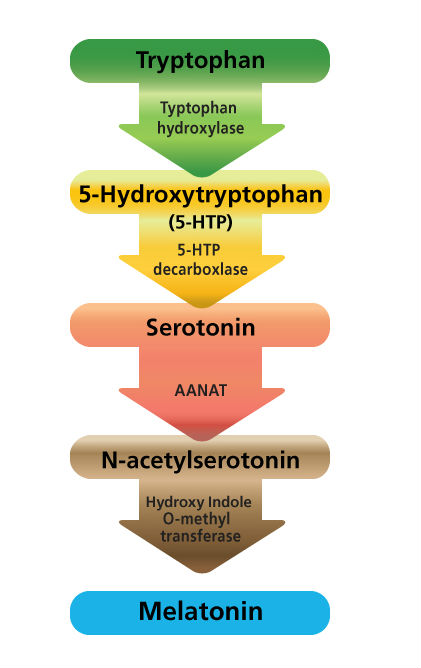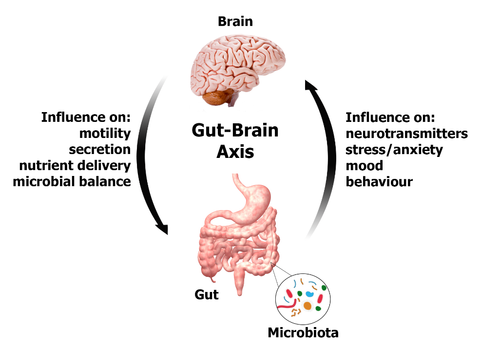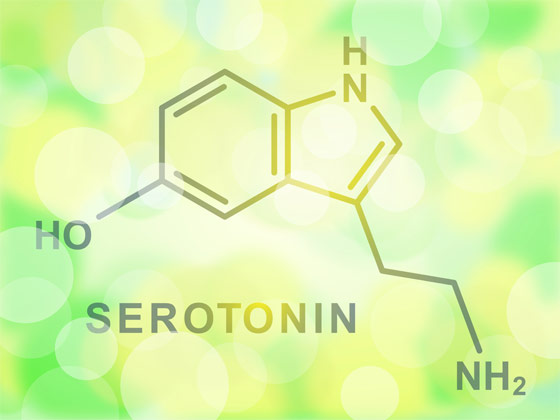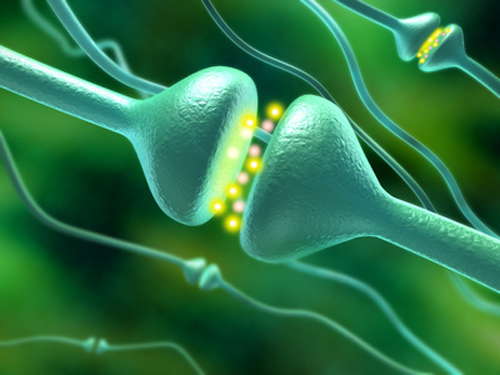Serotonin: Our “Happiness” Hormone
Serotonin (5-hydroxytryptamine or 5-HT), also called the “feel good hormone”, is a monoamine neurotransmitter responsible for a variety of mind and body functions and communication.
It is derived from 5-Hydroxytryptophan (5-HTP), which in turn is derived from tryptophan. Serotonin also converts to melatonin, which is essential for sleep.

Around 90% of serotonin is manufactured in the digestive tract (the enteric nervous system, also known as the “gut brain”) and stored in blood platelets, whilst the remainder is synthesized in neurons in the CNS.
Serotonin itself cannot cross the blood-brain-barrier. As a result, the brain must make and use its own serotonin. It does so by allowing tryptophan (the precursor) to cross the blood brain barrier and the conversion then occurs within the brain.
Another important contributor in the biochemical production of serotonin is vitamin B6. A deficiency in this co-factor impairs the brain’s ability to manufacture serotonin. Some symptoms of vitamin B6 deficiency are similar to serotonin deficiency: depression, confusion and irritability.
Serotonin has a calming effect on both “brains”, the one in the head and one in the gut. Nerve cells in the gut use serotonin to send messages (like gas, bloating and digestive pain) via the vagus nerve to the brain, so that we can learn which foods to eat or avoid. This gut-brain connection highlights the importance of maintaining a healthy gut in order to maintain healthy brain health.



Symptoms of serotonin deficiency include:
- depression
- low mood and emotional numbness
- anxiety disorders
- poor memory
- poor cognitive function
- lack of will power
- improper social behaviour and withdrawal
- lack of impulse control
- anger
- chronic, persistent fatigue
- increased emotional sensitivity
- low self-esteem
- feeling overwhelmed
- feeling overly dependent on others
- poor appetite control
- digestive disorders
- gastrointestinal pain
- obesity
- carbohydrate cravings and binge eating
- eating disorders
- reduced mucous in intestinal linings
- constipation
- low libido
- insomnia and sleep disorders
- obsessive compulsive disorder
- unusually sensitive to pain
- chronic pain
- migraines and headaches
- hot flushes and fluctuating body temperature
- tinnitus
Modulation of serotonin at nerve junctions in the CNS is a major action of many antidepressant medications. The major classes of drugs used are SSRIs (selective serotonin reuptake inhibitors) and SNRIs (serotonin noradrenalin reuptake inhibitors). These drugs allow serotonin to act longer at nerve endings by preventing their reabsorption.
Supplementation with either 5-HT or 5-HTP is also commonly used as alternative treatment.
